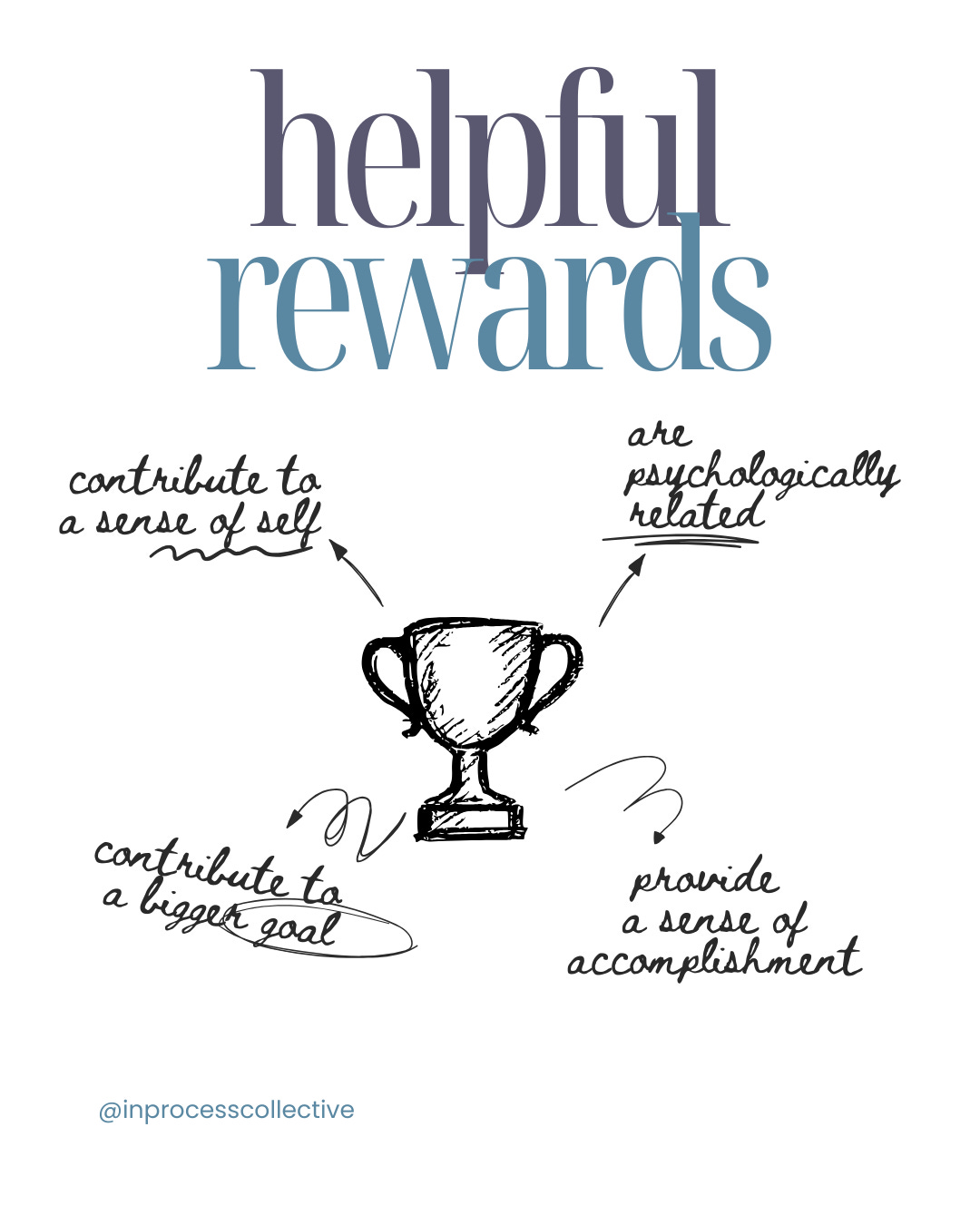How to design rewards that motivate you
Plus a downloadable "Hack-your-dopamine task worksheet
In a newsletter, I promised to share more about how we can create rewards that help motivate us, (and why some rewards don’t work) - so here you are. Read on if you’re interested!
The last post broke down why the dopamine/reward function is so important. TLDR: one of the things dopamine does is train your brain by creating a learning loop that makes it more likely you’ll repeat that task/behavior in the future.
Often, we try to increase our motivation to do certain things by rewarding ourselves for doing them. And that’s good. When our brain doesn’t feel a sense of reward in a task, it concludes the task might not be meaningful, and over time, we lose motivation to do that kind of task.
The tricky thing is - not all rewards are created equal. Some rewards don’t just fail to increase motivation; they may actually decrease it. When you get yourself a random treat after a hard workout, it might feel good in the moment, but it probably isn’t strengthening the workout habit.
The reason? That buzz of dopamine when you feel a sense of accomplishment after completing a task helps our brain tag the task as meaningful, and thats part of what helps us to do it more instinctively and easily in the future. When there’s an external reward unrelated to the task that provokes its own buzz of dopamine, it is almost as if you’re telling your brain that the task isn’t meaningful. If the task itself were so meaningful, why do you need a separate reward?
Plus, the reward of the treat after the workout? That’s a reward for the task of getting a treat, not the workout. Your nervous system isn’t dumb. The task-“working-out” doesn’t result in a treat, the task-“getting-a-treat” results in a treat.
So, if we want to incentivize our brain to do certain tasks, we want to start by cultivating rewards that are:
Psychologically related - external rewards can work if they help your brain double down on the task, if they feel related. Do you remember when you would beat the bad guy in the castle in Mario Brothers? That little chest would come up and pop open and inside was a reward? Video games are great at using dopamine stimulation to get you to keep playing. They offer rewards that are surprising, salient - and in relation to our convo today - psychologically related to the task at hand. Maybe an extra life or a power that helps you as you tackle the next level. It’s not a random, surprising thing that has no relation to the game. So, if we’re getting ourselves rewards for task, they need to be psychologically related to the task. E.g. when you work out five times, you get yourself those new running shoes, (which are only helpful if you are going to keep working out); when you work for 20 straight minutes, you reward yourself with a fresh cup of coffee which will help you with the next 20 minutes.
Provide a sense of accomplishment - dopamine loves progress. So, taking a breath to notice that you finish a task, and having some kind of phsycial or visible ritual to help you track the accomplishment is a real thing. I’m that person who, if I finish a task and discover it wasn’t on my to-do list, I add it and cross it off. After my last year of dopamine deep dive, I finally feel validated in this impulse. This adding-and-crossing-off is not pointless. It helps my brain notice “I did it!” and that buzz of the release of dopamine helps form a learning loop in my brain that helps tasks like this get easier over time. So there.
Contribute to a bigger goal - don’t forget that dopamine loves progress, and one of the neat things about our dopamine system as humans is that it allows us to model and want things that are complicated, far away, that don’t even exist yet. It allows us to dream. And there’s nothing our system loves more than a little micro dopamine release as we finish a task that marks progress towards a future bigger goal. So, it’s helpful to know and reflect on how your tasks, especially your mundane or irritating ones, contribute to reaching bigger goals.
Contribute to a sense of self - research has found that while intrinsic rewards tend to fuel motivation more than external rewards, there is one kind of extrinsic reward that does help motivate: instant praise as you complete a task for effort, progress, or identity-consistency, The theory is, that even though praise is external, it feeds an intrinsic motivation source: who we want to be. Dopamine is interested in you living the best life you can live, and being the person you want to be is a huge part of that life. So when a task helps us feel like we are moving towards that, it can fire that dopamine and begin forming that learning loop. We all have dumb tasks on our list (e.g. medical bills, or medical bills, or medical bills, or insurance). I hate doing these tasks. They are not contributing to a bigger goal. They aren’t helping me level up. But - if I slow down and notice the sense of achievement when I close one out, and layer that with a sense of - look at you! being a responsible adult who is not afraid of insurance agents or phones! 🥰 - it helps my dopamine get a little bump. Which helps me with future motivation for that kind of task.
Phew. Lots of intel here. Hope it’s helpful for forming rewards!
AND - for those of you who are paid subscribers, I’ve synthesized this into a daily task sheet you can use to try out some of these reward strategies. 👇




